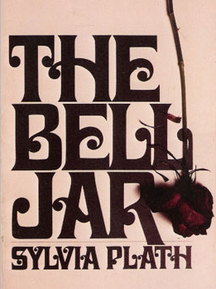
It's an intense, personal book and so it seems fitting that I vividly remember not only when I first read it, but what I brought to it in terms of expectations and background knowledge.
My GCSE English teacher was obsessed with Ted Hughes, who was Plath's husband at the time of The Bell Jar and her suicide. Hughes was on our syllabus, but she probably managed to spend a lot more classroom time on him and his work than was strictly intended. And she talked a lot about his personal life – his marriage to Plath and the fact that some people (unfairly, in her view) blamed him for her suicide.
And then the same teacher recommended I read The Bell Jar. I have no idea why. She read my writing, I confided in her about a couple of things. She told me she thought it would be a good idea. I didn't know what to expect.
I have come back to it a half-dozen times since, and it always strikes me that her description of depression is the most haunting and emotionally resonating I've ever read. She uses the titular bell jar to describe the feeling of being separated from the world – watching but not participating – and the way a depressed person carries that separation around with them: “wherever I sat—on the deck of a ship or at a street café in Paris or Bangkok—I would be sitting under the same glass bell jar, stewing in my own sour air.”
| It's a deeply claustrophobic description in the middle of a deeply claustrophobic novel. There are times I can't read it – being inside the story feels like being placed in a jar, the air removed. Although written in 1963 it is set 10 years earlier, opening with a reference to the electrocution of Ethel and Julius Rosenberg for espionage. | it is a letter from the past that has a lot to say about mental health, the choices we make... |
In a beautiful passage she considers her options:
I saw my life branching out before me like the green fig tree in the story. From the tip of every branch, like a fat purple fig, a wonderful future beckoned and winked. One fig was a husband and a happy home and children, and another fig was a famous poet and another fig was a brilliant professor, and another fig was Ee Gee, the amazing editor, and another fig was Europe and Africa and South America, and another fig was Constantin and Socrates and Attila and a pack of other lovers with queer names and offbeat professions, and another fig was an Olympic lady crew champion, and beyond and above these figs were many more figs I couldn't quite make out. I saw myself sitting in the crotch of this fig tree, starving to death, just because I couldn't make up my mind which of the figs I would choose. I wanted each and every one of them, but choosing one meant losing all the rest, and, as I sat there, unable to decide, the figs began to wrinkle and go black, and, one by one, they plopped to the ground at my feet.
And even as she is crippled by indecision, she is being pushed by those around her to make much smaller choices, to consign herself to the role of supporter. Her mother pushes her to learn shorthand because “an English major who knew shorthand was something else again. … She would be in demand among all the thrilling young men and she would transcribe letter after thrilling letter.”
But this doesn't appeal. “I hated the idea of serving men in any way. I wanted to dictate my own thrilling letters.”
The ideas of sexual freedom thread through Esther's story. She is treated for depression, given electroconvulsive therapy, but it is only when she meets a female doctor who takes her seriously and refers her to have a diaphragm fitted in response to her fear of pregnancy that things begin to change for her.
The novel pre-dates the sexual revolution. But it is a letter from the past that still has a lot to say about mental health, the choices we make, and the ways we are shaped by those around us.
Squeamish Louise


 RSS Feed
RSS Feed
